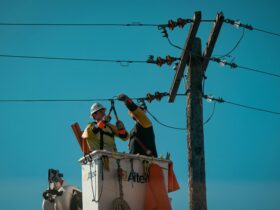Have you ever wondered how massive production lines keep humming along every single day? Or perhaps you’re curious about the specialists who manage the daunting electrical setups behind large-scale manufacturing plants? If so, you’ve come to the right spot. In this post, we’ll examine the fascinating world of industrial electrical work, diving into the intricate systems and highly skilled professionals who ensure Australia’s industrial sector stays powered and efficient.
Industrial electrical work often goes unnoticed by the public eye, yet it is absolutely key to modern industry. While a residential or commercial electrician might spend their day installing power points in a home or setting up lighting in a shopping centre, an industrial electrician deals with more substantial machinery, elaborate control systems, and high-voltage networks. These complex environments demand a distinct set of skills and a thorough appreciation of safety protocols to keep large facilities running around the clock.
In the coming sections, we’ll unpack what is industrial electrical, highlight the unique responsibilities that industrial electricians handle, and explore how you can pursue an industrial electrician license if this path interests you. We’ll also contrast industrial electrician duties with those of residential or commercial electricians, offering a clear picture of each specialism. To wrap things up, we’ll share some future trends and final thoughts on this ever-important field. By the end, you’ll have a clear understanding of why industrial electricians are so essential in our modern, tech-driven industries.
Understanding Industrial Electrical
Industrial electrical refers to the planning, installation, and maintenance of electrical systems in large-scale facilities such as factories, power plants, and gas refineries. It involves everything from setting up electrical distribution networks to troubleshooting and repairing faults in heavy-duty machinery. Unlike simple home installations, industrial electrical work demands an in-depth grasp of power requirements, advanced circuitry, and the ability to handle equipment that may be operating at thousands of volts.
What makes industrial electrical unique is its emphasis on output reliability and worker safety. A breakdown in a factory setting can lead to significant production losses and even safety hazards for employees on the floor. Because of this, industrial electricians apply meticulous care when designing or fixing systems. They often work in teams to assess complex diagrams, integrate control panels, and set up automation systems that help factories produce goods at lightning speed.
In many ways, industrial electrical work shapes the core of our modern manufacturing capabilities. Some might see it as a niche area, but it’s actually vital to various sectors that rely on heavy machinery and process-driven outputs. From petrochemical plants to automotive assembly lines, industrial electrical ensures everything runs securely and efficiently. This broad scope highlights the significance of industrial electrical in driving Australia’s economy forward.
Key Differences from Residential and Commercial Electrical Work
Residential electrical involves tasks like wiring houses, installing switches, and adding lighting fixtures. Commercial electrical, on the other hand, covers shopping malls, office buildings, and schools. While both residential and commercial industrial electricians apply standard electrical principles, their work is typically limited to lower voltage requirements and smaller infrastructures.
In contrast, industrial electrical work centres on significantly larger operations. Factories often host multiple pieces of high-powered equipment, robots for automated production, and advanced monitoring systems. Handling these demands calls for specialised knowledge of motors, sensors, and programmable logic controllers (PLCs) that automate various steps in the production process.
Moreover, industrial electricians must keep strict safety regulations in mind at every turn. High-voltage installations leave little margin for error, and the complexity of equipment requires thorough understanding of hydraulics, pneumatics, and control systems. This deep level of technical knowledge sets industrial electricians apart, making them invaluable in any industry that relies on large-scale manufacturing and operational reliability.
The Role of an Industrial Electrician
An industrial electrician is a qualified professional who plans, installs, troubleshoots, and maintains electrical systems in industrial facilities. They might work in a steel mill, food processing plant, or chemical refinery, where they ensure that conveyors, pumps, motors, and automation lines keep operating with minimal downtime. Because major sites cannot afford extended outages, an industrial electrician’s role is often critical to business performance.
These professionals don’t just swap out lightbulbs or add a new socket. Instead, they deal with complex networks of sensors, wiring harnesses, and monitoring devices that keep large-scale operations in sync. Furthermore, industrial electricians need to grasp mechanical elements as well, since they often coordinate with mechanical technicians and engineers on projects involving both electrical and mechanical systems.
What truly sets an industrial electrician apart from other trades is their broad knowledge base. Many have studied advanced topics like robotics, instrumentation, and process control, so they can tackle the growing trend of factory automation. By staying up to date with modern approaches, they ensure that industrial electrical tasks meet the demands of constantly evolving manufacturing technologies.

Skills and Qualifications Needed
Industrial electricians typically complete an apprenticeship or formal training program before earning their qualifications. Many also carry out extra coursework to gain insights into advanced electrical systems, automation, or instrumentation. This comprehensive background is essential, given the demands of industrial electrical work.
Beyond formal education, an industrial electrician must possess great attention to detail. Mistakes in large-scale electrical settings can trigger serious safety risks. Teamwork and communication skills are also crucial, as they frequently work alongside engineers, plant managers, and other tradespeople. The ability to interpret complex schematics and quickly adapt to new technologies is a massive advantage, especially in an industry where automation is constantly on the rise.
Ultimately, what sets a seasoned industrial electrician apart is their combination of theoretical knowledge and practical hands-on experience. By mastering these skills, they can handle everything from minor repairs to large-scale installations that keep Australia’s industries thriving.
Exploring Industrial Electrical Work
Typical Tasks in Australian Settings
Australia’s industrial sector covers everything from mining and agriculture to advanced manufacturing plants in cities like Melbourne and Sydney. Within these settings, industrial electrical work can include wiring high-capacity grain silos, installing massive conveyor systems in mining sites, or automating bottling plants for the beverage industry. Given the wide variety of settings, industrial electricians need a flexible skill set to adapt to each facility’s specific requirements.
One day, they might be monitoring the performance of hydraulic presses in an automotive plant. The next day could involve upgrading the sensor network on a production line that processes dairy products. It’s a job that demands not just electrical knowledge but also adaptability, quick decision-making, and a keen ability to solve problems under pressure. Since many industrial environments run 24/7, these electricians may also work in shifts to ensure systems remain operational at all times.
On top of that, Australian regulations around industrial electrical work are designed to keep workplaces safe and efficient. Industrial electricians are expected to follow strict standards, including proper machine guarding, lockout/tag-out procedures, and safe handling of high-voltage components. These measures help reduce the risk of accidents, ultimately protecting both workers and the environment.
Common Equipment and Technologies
At the heart of any industrial facility is a vast range of equipment that depends on careful electrical support. You’ll find variable frequency drives (VFDs) controlling motor speeds, PLCs interpreting sensor data, and advanced robotic arms handling repetitive tasks with minimal human intervention. Industrial electricians must be familiar with all these components to keep them in peak condition.
What’s more, communication between machines is often facilitated by industrial ethernet systems, meaning industrial electricians may also deal with networking hardware and control software. In an era where factories are turning to the Industrial Internet of Things (IIoT) for real-time monitoring, these professionals must be prepared to install and maintain sensors that collect data on everything from temperature to machine performance.
Safety features also play a key part in industrial setups. Circuit breakers, isolation switches, and emergency stops are built into the system to prevent accidents. Ensuring these devices function correctly is one of the core industrial electrician duties. Through careful testing and verification, they confirm that a plant’s electrical network can withstand surges, fluctuations, or mechanical failures.
Safety and Compliance Considerations
Industrial environments are dynamic places with heavy machinery, high voltage lines, and fast-moving automated systems. Because of this, safety is non-negotiable in industrial electrical work. In Australia, guidelines such as those outlined by Safe Work Australia and other regulatory bodies define the measures needed to protect workers. Proper lockout/tag-out procedures ensure machines are fully de-energised before repairs begin, preventing unexpected restarts that could endanger staff.
Plus, compliance extends beyond physical safety measures. Industrial electricians must ensure each installation meets local and national electrical codes. From using the correct cable sizing to installing the right circuit protection, there’s no room to cut corners in industrial electrical settings. Failure to comply can lead to serious legal consequences, fines, or even injuries.
Finally, health and safety training is a continuous process, not a one-time requirement. Many facilities implement regular refresher courses and audits to identify potential hazards. Industrial electricians who stay updated on emerging safety protocols can help create a safer workplace for everyone.
Conclusion
Looking ahead industrial electrical work is set to become even more tech driven. Factories will likely incorporate robotics, artificial intelligence, and advanced analytics to boost efficiency and reduce downtime. Industrial electricians who embrace these changes—learning to programme collaborative robots or manage big data insights—can look forward to a career that keeps expanding in scope and importance. With Australia poised to increase its manufacturing capacity, there’s no shortage of exciting opportunities on the horizon.
Industrial electricians are at the forefront of maintaining the machinery and electrical networks that propel our modern way of life, especially in a country like Australia where large-scale production is a cornerstone of the economy. By mastering the tools and technologies behind industrial electrical work, these professionals guarantee smooth operation and safe, efficient workplaces.
Whether you’re curious about approaching a career as an industrial electrician or simply fascinated by the hidden infrastructure supporting today’s manufacturing, there’s no denying the importance of these specialists. From rigorous training requirements to high-level problem-solving, industrial electricians combine knowledge, adaptability, and hands-on expertise to tackle some of the most demanding tasks in the electrical sector.
Ultimately, industrial electricians keep industry moving—literally and figuratively. They troubleshoot machinery breakdowns, enhance automation systems, and make certain that factories run like clockwork. If you thrive on technical challenges and want to shape the future of manufacturing, consider this role more than just a job—it’s a pathway to becoming an essential part of Australia’s industrial success story.










Leave a Review